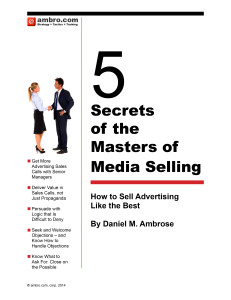We have all been there. We are so excited about our media property, and so convinced it is right for the customer, we talk too much. We never give the client the opportunity to tell us about their views, or their needs, or even objections. Here are some ideas from Selling Power on how to be a better sales listener.
Talking too much in sales situations is the scourge of both over confident sales people as well as nervous sales people. Sales people who aren’t prepared talk too much to cover up their lack of preparation, and true believers are too busy telling and not selling (with listening).
I encourage ad sales people to think of their sales calls like dates. If they talk too much on the first date, they’ll never get another. No second date, no sale. Sales people need to offer something of value on their first date, the sales-equivalent of a guy bringing flowers. In advertising sales this little gift to start things off is most often information or perspective of value about the client’s market situation. That is the one thing we know all clients want. Or it could be as simple as showing you care enough to prepare an agenda. By creating an agenda before the meeting, and mentioning it casually in their opening, a sales person will be presenting a little “I care, so I prepare” present to the prospect they are meeting for the first time, or a long time client who they are meeting with again.
And using an agenda to sell advertising also provides the sales person a way to ask up front — in the agenda they propose — for permission to ask questions.
Good advertising sales people and sales managers know how to engage the advertising sales prospect with a conversational barter. First they tell the prospect something they know or hypothesize about the prospects situation or needs, then they ask for feedback. This conversational barter engages the prospect by giving them something (data? observation? hypothesis?) before asking for something (feedback? confirmation? re-direction? guidance?).
This tactic requires one other skill: Silence. When you ask for feedback or guidance, you must be silent as long as it takes to get the client to talk.
Every big sale I ever made as a sales person came as a result of listening aggressively to what the client was saying, making a hypothesis about where that could lead, and finally saying “what if I could do such and so.” Then with more listening I was able make a sale 10 times bigger than what I aimed for going in. All because of the listening.

